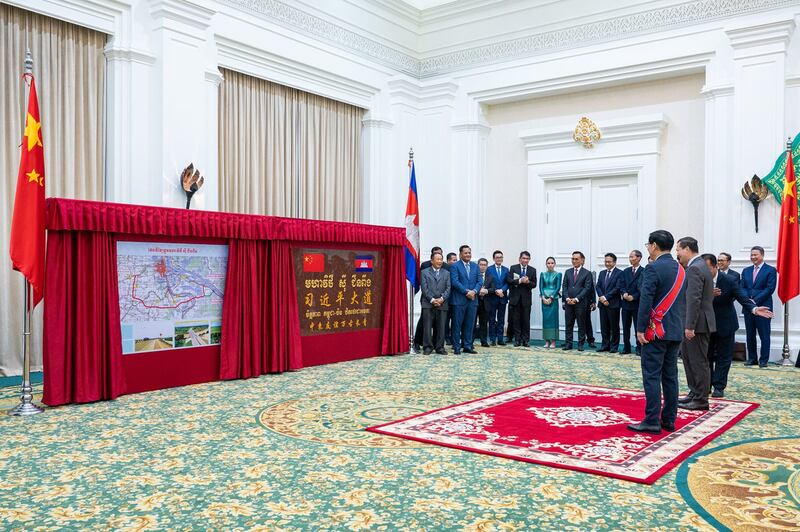Cambodia has renamed one of its main roads in the capital Phnom Penh “Xi Jinping Boulevard” in honor of the Chinese president for his “historical contribution to the development of Cambodia.”
A ceremony for naming the road was held on Tuesday at the Peace Palace, with Cambodian Prime Minister Hun Manet and outgoing Chinese Ambassador Wang Wentian in attendance, said the Chinese Embassy in Cambodia on its Facebook page on Wednesday.
“This marks another major milestone that shows that the two countries’ relations have a long history and are strong and correct,” said Wang. “The Chinese side is happy to cooperate with Cambodia to continue on the glorious path of preserving the legacy of this steel friendship, creating a brighter and brighter future for the common destiny community between China and Cambodia in the new era.”
The boulevard, previously known as the Third Ring Road, was constructed at a cost of US$273 million, with concessional financing from the Chinese government and contributions from the Cambodian government, according to the Khmer Times.
Hun Manet also wrote on his Facebook page Tuesday that China had strongly approved the renaming, which “has a huge meaning to the Cambodia-China ironclad friendship”.
“Cambodia-China relations are long-standing and have grown to an inseparable level,” the prime minister, the son of veteran leader Hun Sen, said. “This relationship embodies the values of mutual trust, especially political trust. China’s assistance has not only helped socio-economic development in Cambodia but also strengthens its political independence.”

Xi Jinping Boulevard connects National Road 4 in Phnom Penh’s Por Senchey district, to National Road 1 in Kandal province’s Kien Svay district. The construction work, undertaken by the Chinese company Shanghai Construction Group Co Ltd, began on Jan.14, 2019, and included four flyovers and eight bridges. The boulevard spans 15 km (9 miles) in Phnom Penh and 38 km (24 miles) in Kandal.
Phnom Penh already has a Mao Tse Toung Boulevard, named by then head of state, Prince Norodom Sihanouk in 1965, in honor of the first chairman of the People’s Republic of China, Mao Zedong. .
China supported the notorious Khmer Rouge regime in the late 1970s and maintained that support when the ousted communists battled a Vietnamese-backed government, of which Hun Sen was a member, through the 1980s. But relations between Phnom Penh and Beijing have blossomed since the 1990s.
Wednesday’s announcement came days before a visit by U.S. Defense Secretary Lloyd Austin.
After attending the Shangri-La Dialogue in Singapore this week, Austin will on Saturday travel to Phnom Penh, where he is set to meet Hun Manet, the Financial Times reported, citing three American officials.
Hun Manet, who took over as prime minister from his father last year, is a graduate of West Point, the elite U.S. military academy, and also studied at New York University, fostering optimism among U.S. officials for an improvement in relations with a country that has grown so close to China.
“We remain clear-eyed about some of our concerns in Cambodia, but at the same time we see the arrival of the new leadership allowing us to explore new opportunities,” the Financial Times quoted one U.S. official as saying.
A statement released by the Pentagon on Friday said that Austin hoped to build on meetings he had with senior Cambodian officials when he last visited for a summit of Association of Southeast Asian Nations defense ministers in November 2022.
The United States has criticized the Chinese-led expansion of the Ream naval base near the port of Sihanoukville, asserting that it appears to be establishing a permanent Chinese naval presence, thereby enabling Beijing to project power across the Gulf of Thailand.
Cambodia denies that China is constructing a permanent base, which would violate Cambodia’s 1993 Constitution. However, the frequent naval drills conducted by the two countries’ navies have not alleviated the concerns of critics.
Edited by Mike Firn.
